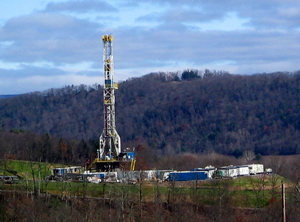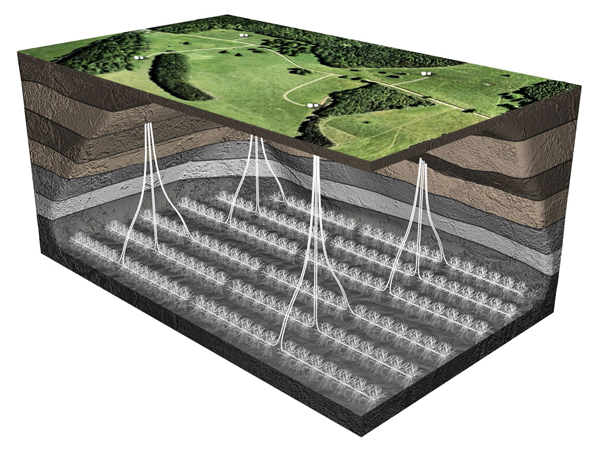SHALE GAS
UK government says health risk from extraction emissions low / Industry needs regulating
 The visible, above-ground view of a shale gas drill in the US state of Pennsylvania (Photo: Wikipedia/Ruhrfisch) |
“According to currently available evidence, the risks to public health from exposure to emissions from shale gas extraction are low if the operations are properly run and regulated,” the UK government has concluded. The latest findings in an ongoing drive to allay public fears about hydraulic fracturing, or fracking, are based on a new report by government agency Public Health England (PHE, London; www.gov.uk/government/organisations/public-health-england). As commercial experience with drilling inside the UK is limited, the report’s recommendations are based on experience in other countries, principally the US.
The PHE report focuses on air pollution from stationary on-site sources, along with radon; water pollution including use of fracking fluids, flowback water, heavy metals and the risk to water courses and aquifers as well as disposal and treatment of waste water. It does not deal with subjects such as occupational health, climate change and greenhouse gas emissions, water usage nor water sustainability.
Explicitly, PHE did not examine the question of whether fracking can cause earthquakes – one of the concerns that led to the moratorium implemented in mid-2011 after two small earthquakes following test drilling near Blackpool in Lancashire and removed at the end of 2012.
Most of the evidence collected points to what the agency called operational failure in a poorly regulated environment. Contamination of ground water, if it occurs, is most likely to be caused by leakage through the vertical borehole, it said, rather than from the fracking process itself. However, PHE acknowledged that “surface spills of fracking fluid or waste water may affect groundwater, and emissions to air also have the potential to impact on health.”
Terming good on-site management and appropriate regulation “essential,” the government said the findings shows a need for close regulation of the fracking industry. In future, it said, the permitting process for shale gas exploration would require drilling companies to satisfy regulators that their proposals and operations will minimise potential risks to the environment and public health.
Recommendations made by PHE include “consideration of emission inventories” as part of the regulatory process, along with public disclosure and risk assessment of chemicals used in the fracking process. The agency said evidence from the US suggests that maintenance of well integrity, including post operations, as well as appropriate storage and management of fracking fluids and wastes should be essential aspects of the regulatory process.
The PHE report focuses on air pollution from stationary on-site sources, along with radon; water pollution including use of fracking fluids, flowback water, heavy metals and the risk to water courses and aquifers as well as disposal and treatment of waste water. It does not deal with subjects such as occupational health, climate change and greenhouse gas emissions, water usage nor water sustainability.
Explicitly, PHE did not examine the question of whether fracking can cause earthquakes – one of the concerns that led to the moratorium implemented in mid-2011 after two small earthquakes following test drilling near Blackpool in Lancashire and removed at the end of 2012.
Most of the evidence collected points to what the agency called operational failure in a poorly regulated environment. Contamination of ground water, if it occurs, is most likely to be caused by leakage through the vertical borehole, it said, rather than from the fracking process itself. However, PHE acknowledged that “surface spills of fracking fluid or waste water may affect groundwater, and emissions to air also have the potential to impact on health.”
Terming good on-site management and appropriate regulation “essential,” the government said the findings shows a need for close regulation of the fracking industry. In future, it said, the permitting process for shale gas exploration would require drilling companies to satisfy regulators that their proposals and operations will minimise potential risks to the environment and public health.
Recommendations made by PHE include “consideration of emission inventories” as part of the regulatory process, along with public disclosure and risk assessment of chemicals used in the fracking process. The agency said evidence from the US suggests that maintenance of well integrity, including post operations, as well as appropriate storage and management of fracking fluids and wastes should be essential aspects of the regulatory process.
 Schematic perspective of hydraulic fracturing process (Illustration: Statoil) |
Up to now, there have been no peer-reviewed published investigations on the impact of shale gas extraction in the UK or other European countries, the PHE report points out, while noting the potential impacts on drinking water sources have been considered in several UK reviews. It also points out that EU regulations do not permit drilling below fresh water aquifers, which limits the risk of contaminating drinking water. However, the bromine content of the water at this level makes the water recycling process more difficult.
The draft report will be available for comment during the entire month of November.
e-Service:
Review of the Potential Public Health Impacts of Exposure to Chemical and Radioactive Pollutants as a Result of Shale Gas Extraction as PDF
12.11.2013 Plasteurope.com [226753-0]
Published on 12.11.2013

 German version of this article...
German version of this article...